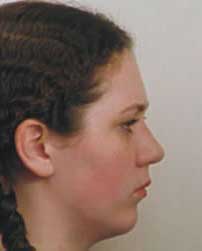Research judged by the Public and Dentists’ showed the improvement on the face and teeth using the Orthotropic method was ‘highly significant’ in comparison to conventional Orthodontics (Mew 2015). Dentists much prefer Orthotropic results but may not recommend them because growth guidance takes longer and is more expensive. However orthodontic treatment usually requires extractions and wearing a brace afterwards for many years to hold the teeth straight.
(Mew JRC 2015. Visual Comparison of Excellent Orthodontic Results with Excellent Postural Results? Kieferorthopädie 2015;29(4):1–15)
Parents have a simple choice:
For the last hundred years, most orthodontists have taken the second option because it is easier and quicker than guiding the growth of the jaws. This is despite knowing that this option usually increases unattractive vertical growth and many good looking children finish with obvious damage (see Mary below). Teeth can be straightened at any age but if the jaws have grown the wrong way they are likely to require surgery.
Hundreds of children in the UK are sent for surgery each year although it can be completely avoided with Orthotropics.


All orthodontists are legally obliged to tell patients about alternative methods of treatment, especially if they are recommending irreversible procedures such as extractions or surgery. Unfortunately, not all do so. If you were not told about alternatives, you have a legal right to complain. Mary above was told she would have to have four extractions and her teeth pulled back but she was not informed there was any alternative. You can see how the ‘train tracks’ changed her horizontally growing face to vertical, with flat cheeks, and a receding chin (illustration above). Because her parents complained about the damage to her face, the orthodontist suggested surgery to cut and reposition her jaws, so her parents sought a second opinion but by then it was too late to restore her growth.
Unfortunately citizens of the UK are unlikely to receive much help from the General Dental Council because this type of facial damage is considered normal. So we recommend that before treatment patients explore the various websites for themselves and balance the needs of their children against the effort and expense involved. Do they want a ‘cure’ or are they content to settle for straight teeth with the risk of facial damage and the need to wear permanent retention afterwards.